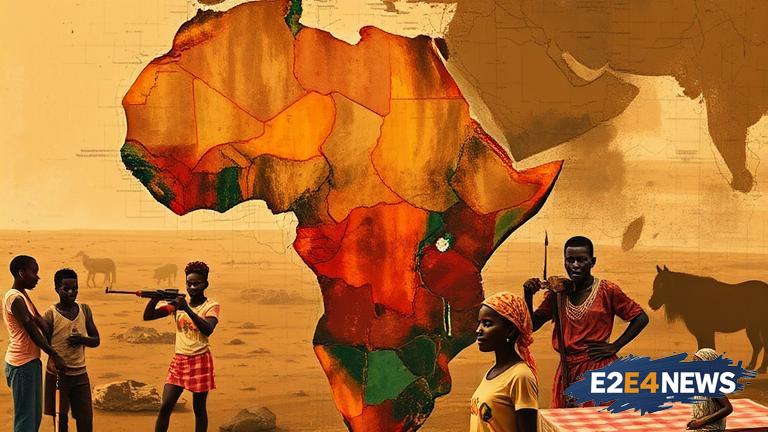The battle over the frame is a critical issue in Africa, where the continent’s narrative has long been shaped by external forces. For decades, Western media and institutions have dominated the conversation about Africa, often perpetuating negative stereotypes and reinforcing harmful power dynamics. However, in recent years, African nations and individuals have begun to push back against these dominant frames, seeking to reclaim their narrative and challenge the status quo. This movement is driven by a desire to promote more nuanced and accurate representations of Africa, and to challenge the simplistic and often racist portrayals that have been perpetuated by Western media. One of the key challenges facing African nations is the legacy of colonialism, which has left a lasting impact on the continent’s media landscape. Many African countries still rely on Western-dominated media outlets for news and information, which can perpetuate negative stereotypes and reinforce dominant Western frames. However, there are also many African media outlets and journalists who are working to challenge these dominant narratives and promote more nuanced and accurate representations of the continent. Social media has also played a crucial role in this battle, with many Africans using platforms like Twitter and Facebook to share their own stories and challenge dominant Western frames. Despite these efforts, there are still many challenges facing African nations as they seek to reclaim their narrative. One of the biggest obstacles is the lack of funding and resources for African media outlets, which can make it difficult for them to compete with Western-dominated media. Additionally, many African journalists face censorship and intimidation, which can limit their ability to report on critical issues and challenge dominant Western frames. Furthermore, the legacy of colonialism and the ongoing impact of neoliberalism have created significant power imbalances between Africa and the West, which can make it difficult for African nations to challenge dominant Western narratives. Nevertheless, there are many reasons to be optimistic about the future of African media and the battle over the frame. In recent years, there has been a surge in African-led media initiatives, which are working to promote more nuanced and accurate representations of the continent. These initiatives include online publications, social media platforms, and traditional media outlets, all of which are playing a critical role in challenging dominant Western frames and promoting African perspectives. Moreover, there is a growing recognition of the importance of African media and the need to support and empower African journalists and media outlets. This recognition is driven by a growing understanding of the critical role that media plays in shaping our perceptions of the world and the need to promote more diverse and nuanced representations of Africa. In conclusion, the battle over the frame is a critical issue in Africa, where the continent’s narrative has long been shaped by external forces. However, in recent years, African nations and individuals have begun to push back against these dominant frames, seeking to reclaim their narrative and challenge the status quo. While there are still many challenges facing African nations, there are also many reasons to be optimistic about the future of African media and the battle over the frame. With the support of African-led media initiatives and a growing recognition of the importance of African media, it is possible to imagine a future where African nations are able to reclaim their narrative and challenge dominant Western frames. This would not only promote more nuanced and accurate representations of Africa but also help to challenge the simplistic and often racist portrayals that have been perpetuated by Western media. Ultimately, the battle over the frame is a critical issue that has significant implications for Africa and the world. It is a battle that is being fought on many fronts, from social media to traditional media outlets, and it is a battle that requires the support and engagement of Africans and non-Africans alike. By working together to challenge dominant Western frames and promote more nuanced and accurate representations of Africa, it is possible to create a more just and equitable media landscape that reflects the diversity and complexity of the continent. The battle over the frame is also closely tied to issues of power and representation, and it is a battle that requires a critical examination of the ways in which media shapes our perceptions of the world. By examining the ways in which media reinforces or challenges dominant power dynamics, it is possible to gain a deeper understanding of the critical role that media plays in shaping our perceptions of Africa and the world. Furthermore, the battle over the frame is also closely tied to issues of identity and culture, and it is a battle that requires a critical examination of the ways in which media shapes our understanding of African identity and culture. By examining the ways in which media reinforces or challenges dominant Western frames, it is possible to gain a deeper understanding of the critical role that media plays in shaping our perceptions of Africa and the world. In addition, the battle over the frame is also closely tied to issues of economics and politics, and it is a battle that requires a critical examination of the ways in which media shapes our understanding of African economies and politics. By examining the ways in which media reinforces or challenges dominant Western frames, it is possible to gain a deeper understanding of the critical role that media plays in shaping our perceptions of Africa and the world. Overall, the battle over the frame is a complex and multifaceted issue that requires a critical examination of the ways in which media shapes our perceptions of Africa and the world. It is a battle that is being fought on many fronts, from social media to traditional media outlets, and it is a battle that requires the support and engagement of Africans and non-Africans alike.
